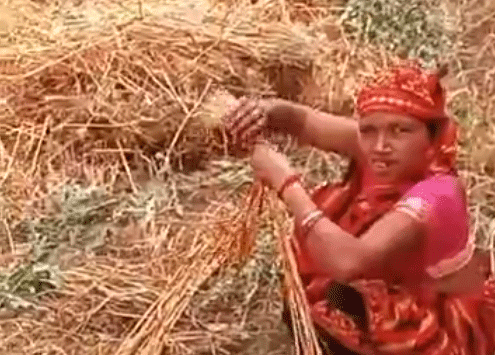Weather Woes Hit Wheat: Farmers in Hariharpur Face Yield Losses from Heat and Drought
This season, wheat farmers in Hariharpur, Uttar Pradesh, especially those in Ranipur Kursaha, have reported a sharp decline in crop production. Local grower Jagaram Vishwakarma, a progressive farmer, described how the lack of timely rain during grain filling and harvesting, along with sudden high temperatures, led to dehydrated soils and premature grain drying, drastically reducing yields.
What Happened: A Tale of Heat and Hope
Wheat, a cool-season crop, requires moderate temperatures, particularly during the grain-filling stage, ideally between 22°C and 25°C. However, according to regional meteorological data, temperatures soared beyond 32°C in early March 2024, while pre-harvest rainfall was almost 40% below normal. The combination of low soil moisture and heat stress during critical stages led to:
- Shriveled grains
- Reduced tillering
- Lower grain weight
These are common physiological impacts when wheat faces water stress during late stages of growth. Studies by the Indian Institute of Wheat and Barley Research (IIWBR) confirm that terminal heat stress can reduce wheat yields by 15%–30%, depending on the intensity and duration.
Farmer Response and Growing Concerns
Farmers like Jagaram are now turning to government assistance, including:
- Compensation through the Pradhan Mantri Fasal Bima Yojana (PMFBY) crop insurance scheme
- Requests for input subsidies for seeds, fertilizers, and irrigation
- Inclusion in relief measures under the National Disaster Response Fund (NDRF)
However, access and coverage remain uneven. Many smallholders either lack awareness or face delays in claim processing, highlighting the need for faster and more transparent mechanisms.
Long-Term Solutions: Adapting to Climate Stress
To combat increasing climate unpredictability, experts recommend:
- Drought- and heat-tolerant wheat varieties such as HD-3086, HD-3226, and DBW-187
- Micro-irrigation systems like drip and sprinkler irrigation to conserve water
- Mulching and zero-tillage to preserve soil moisture
- Agro-advisory services for real-time weather updates and best-practice guidance
The Indian Council of Agricultural Research (ICAR) has emphasized the importance of developing climate-smart villages to build resilience through integrated weather, crop, and soil data.
The wheat crisis in Hariharpur is a stark reminder that agriculture remains highly vulnerable to climate extremes. While short-term relief is critical, long-term investment in climate-resilient practices and technologies is equally vital. With coordinated support from governments, scientists, and local communities, it’s possible to secure the livelihoods of farmers and the future of food production.
Error





